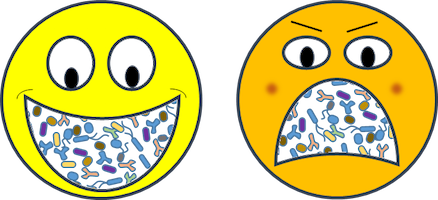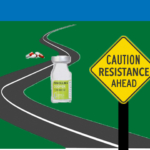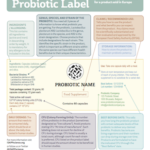You Have the Microbiota You Deserve!
March 2017. By Colin Hill, PhD, APC Microbiome Institute, School of Microbiology, University College Cork, Ireland
Your microbiota has been selected stochastically from all of the microbes you have encountered during your life, from or perhaps even before your birth. It has also been modified by a number of variables, including your genome, your birth mode, your diet, your health status, your environment and many other factors. At this moment in time it is in a particular configuration as a result of your multiple encounters with nature and nurture. It is unique to you, and hopefully it is relatively stable and resilient. However, if you change your diet significantly, take antibiotics, become unhealthy or regain health, lose or gain weight, move to a less or more developed country, your microbiota will also change. So, at what point is your microbiota optimal and at what point is it sub-optimal and perhaps contributing to ill-health – a state often referred to as ‘dysbiosis’?
Dysbiosis is a very loaded term; ‘dys’ is defined as a combining form meaning “ill” or “bad”, implying that the microbiota being described is actually causing harm. Can we really say that any particular microbiota is ‘ill’ or ‘bad’? Maybe, to paraphrase Tolstoy’s comment on families, we can say that in healthy individuals all microbiotas are optimal, but that in unhealthy individuals all microbiotas are dysbiotic in their own way. But this is instinctively unsatisfying, and means that the term has little value as a scientific descriptor. It becomes even more confusing if we consider your microbiota and my microbiota – your beneficial microbiota could well drive disease in me and therefore be considered dysbiotic, even though we could share many characteristics, including our general health or disease status.
But suppose you have a relatively stable gut microbiota and your doctor prescribes a broad spectrum antibiotic. Your microbiota is disrupted and within a few days you succumb to antibiotic associated diarrhoea – surely we can refer to this as dysbiosis? Well, maybe not. It could be argued that disrupted microbiota may well be appropriate for someone following antibiotic treatment – and perhaps diarrhoea may well be the correct evolutionary response to a massive microbial disruption? Perhaps we have evolved to react to a substantial change in the gut microbiota with a version of colonic irrigation to ‘purge’ the system and accelerate the return to a stable diverse microbiota.
It could be reasoned that there are other instances where the term ‘dysbiosis’ might be useful. Consistent observations of reduced diversity or specific alterations in the microbiota of individuals with certain disease states could be thought of as dysbiosis. But an individual with a specific chronic health condition may be simply selecting for a microbiota with reduced diversity, or altered ratios of specific phyla, genera or species. It may even be that someone with a particular disease may benefit from having such an altered microbiota.
The aphorism attributed to Baas Becking – ‘Everything is everywhere, but, the environment selects’ – may be the key concept. Inevitably, each different environment will select a different microbiota. The microbiota then influences the environment, which influences the microbiota, until a stable outcome is achieved. Any external perturbation now has the potential to disrupt this homeostasis. These changes may be subtle or dramatic, they may slow down or reverse disease development, or they may exacerbate or sustain a chronic disease state. We need more evidence of causality before we can even begin to discuss ‘good’ and ‘bad’ members of the microbiota, and we are a long way from identifying an optimal microbiota. This is true for any given individual, never mind the problem of defining what constitutes a good microbiota at a population level. Even if we adopt the concept that the microbiota in a healthy individual is intrinsically healthy, we still cannot know if it is actually driving as yet unseen health defects (cancer, inflammation, neurological diseases?) which will only be obvious over extended time.
There is also the evidence that faecal microbiota transplants (FMT) work well in individuals with Clostridium difficile associated diarrhoea, and promising results are emerging for other health states. This suggests that ‘good’ microbiotas can supplant dysbiotic ones and confer health benefits. But FMT has not been subjected to the kind of rigorous blinded and controlled investigations that more precise interventions would be expected to undergo, and the jury has to remain out for now on whether we can characterise FMT as the replacement of a dysbiotic microbiota with an optimal one.
So, can we talk about ‘good’ and ‘bad’ microbiotas in general terms? Perhaps we can. Resilience to change is almost certainly a feature of a stable microbiome; and if you are healthy, not changing is almost certainly a good thing. Also, the concept of diversity as an asset is not limited to microbiotas, but is an established ecological principle. Of course, we also have to recognise that there will be exceptions to every rule, and that the optimal vaginal microbiota may well be one of low diversity. Nonetheless, we can still have meaningful discussions about increasing diversity and supporting resilience as desirable targets, particularly in complex microbiotas such as that in the gut. But we should be careful of assuming that increasing diversity is always beneficial, because introducing a member of one microbiota to another (and therefore increasing diversity) may have unforeseen consequences. For a ‘real-world’ example, introducing rabbits into the Australian environment increased diversity by one species in the short term, but in the absence of appropriate predators they have caused tremendous damage to a previously stable ecosystem.
We can suggest that where an individual symbiont (such as a healthy human) is in a state of homeostasis and has a stable microbiota, any disruption could present a risk to health. But we don’t need to call this ‘dysbiosis’. We can simply refer to it as ‘changed’, ‘altered’, ‘modulated, ‘disrupted’ or ‘in flux’. So, let’s be careful about speaking of dysbiotic microbiotas. At this point in our understanding we cannot know whether you have a ‘good’ or a ‘bad’ microbiota, but we can say that based on your life to date ‘you have the microbiota you deserve’!







